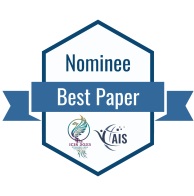Paper Number
1120
Paper Type
Completed
Description
Non-experts struggle in human-AI collaboration due to AI’s differences from more traditional technologies, such as inscrutability. Meanwhile, information systems research on AI education primarily focuses on students in formal learning settings and neglects non-expert adults. Applying a design science research approach, we develop a learning application (“AiLingo”) as an informal learning experience to advance non-expert adults’ AI literacy. Based on self-determination theory, we deduct design principles and features tailored to non-expert adults. Through experimental evaluation (n = 101), we find that a learning experience with our design features present (vs. absent) leads to greater AI literacy advancement. Additionally, we find downstream effects of AI literacy, as it increases AI usage continuance intention and leads to a more positive attitude toward AI. Our study contributes to AI literacy and educational literature with a perspective on non-expert adults, novel design knowledge for AI education, and the discovery of crucial AI literacy consequences.
Recommended Citation
Pinski, Marc; Haas, Miguel; and Franz, Anjuli, "AiLingo – A Design Science Approach to Advancing Non-Expert Adults’ AI Literacy" (2023). ICIS 2023 Proceedings. 10.
https://aisel.aisnet.org/icis2023/learnandiscurricula/learnandiscurricula/10
AiLingo – A Design Science Approach to Advancing Non-Expert Adults’ AI Literacy
Non-experts struggle in human-AI collaboration due to AI’s differences from more traditional technologies, such as inscrutability. Meanwhile, information systems research on AI education primarily focuses on students in formal learning settings and neglects non-expert adults. Applying a design science research approach, we develop a learning application (“AiLingo”) as an informal learning experience to advance non-expert adults’ AI literacy. Based on self-determination theory, we deduct design principles and features tailored to non-expert adults. Through experimental evaluation (n = 101), we find that a learning experience with our design features present (vs. absent) leads to greater AI literacy advancement. Additionally, we find downstream effects of AI literacy, as it increases AI usage continuance intention and leads to a more positive attitude toward AI. Our study contributes to AI literacy and educational literature with a perspective on non-expert adults, novel design knowledge for AI education, and the discovery of crucial AI literacy consequences.
When commenting on articles, please be friendly, welcoming, respectful and abide by the AIS eLibrary Discussion Thread Code of Conduct posted here.




Comments
03-Learning